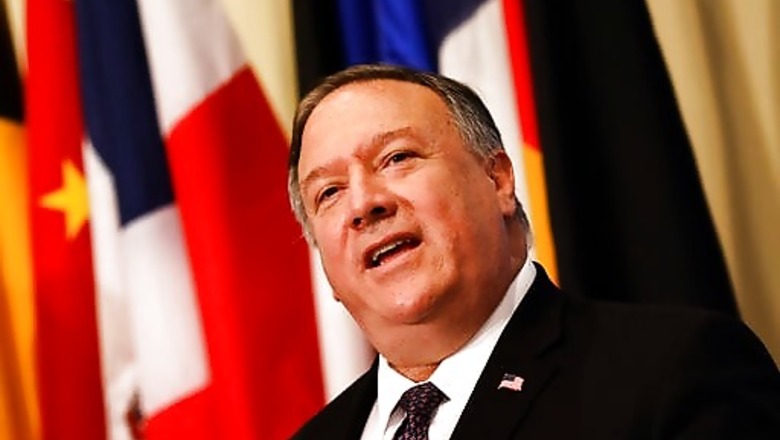
views
WASHINGTON: Secretary of State Mike Pompeo is headed to the Middle East, the first of two senior U.S. officials to travel to the region this week as the Trump administration presses an ambitious Arab-Israeli peace push.
Pompeo departs Sunday for Israel, Gulf Arab states and Sudan. Hell be followed to many of the same destinations later in the week by President Donald Trumps senior adviser and son-in-law Jared Kushner, diplomats said.
The separate visits come as the administration seeks to capitalize on momentum from the historic agreement between Israel and the United Arab Emirates to establish diplomatic relations.
In addition to Israel and Sudan, the State Department said Pompeo would travel to Bahrain and the United Arab Emirates. Officials said stops in Oman and Qatar are also possible.
The U.S. commitment to peace, security, and stability in Israel, Sudan, and among Gulf countries has never been stronger than under President Trumps leadership,” the State Department said in a statement announcing Pompeo’s trip.
Kushner and his team are expected to visit Israel, Bahrain, Oman, Saudi Arabia and Morocco on their trip, which is scheduled to begin at the end of the week, according to the diplomats, who spoke on condition of anonymity because the itinerary has not yet been finalized or publicly announced.
In Israel, Pompeo will meet with Prime Minister Benjamin Netanyahu “to discuss regional security issues related to Irans malicious influence, establishing and deepening Israels relationships in the region, as well as cooperation in protecting the U.S. and Israeli economies from malign investors, the State Department said.
Malign investors is a reference to China, which is seeking to gain a commercial foothold in Israel.
In Khartoum. Pompeo will meet Sudanese Prime Minister Abdalla Hamdok to discuss continued U.S. support for the civilian-led transitional government and express support for deepening the Sudan-Israel relationship, the department said. Sudan is eager to be removed from the U.S. list of state sponsors of terrorism and normalizing ties with Israel would be a step toward that goal.
However, removal from the terrorism list is also dependent on completion of a compensation agreement for victims of the 1998 bombings of the U.S. embassies in Kenya and Tanzania. A tentative deal struck several months ago is still awaiting finalization.
Neither Pompeo’s nor Kushner’s trips is expected to result in announcements of immediate breakthroughs, but both are aimed at building on the success of the Israel-UAE agreement by finalizing at least one, and potentially more, normalization deals between Arab countries and Israel in the near future.
The administration has forged ahead with those efforts over Palestinian objections and without any indication the Palestinians are willing to enter negotiations with Israel. The Arab world had long held that a settlement to the long-running Israeli-Palestinian conflict was a prerequisite for a comprehensive Arab-Israeli peace.
Israel and the United Arab Emirates announced on Aug. 13 they would establish full diplomatic relations, in a U.S.-brokered deal that required Israel to halt its contentious plan to annex occupied West Bank land sought by the Palestinians.
The agreement was a key foreign policy victory for Trump as he seeks reelection and reflected a changing Middle East in which shared concerns about archenemy Iran have largely overtaken traditional Arab support for the Palestinians.
Last week, the administration took the controversial step in the U.N. Security Council of triggering the restoration of all international sanctions on Iran, something that only Israel and the Gulf Arab nations have publicly supported. Thirteen of the 15 council members, including U.S. allies Britain, France and Germany, have rejected the move.
Disclaimer: This post has been auto-published from an agency feed without any modifications to the text and has not been reviewed by an editor

















Comments
0 comment